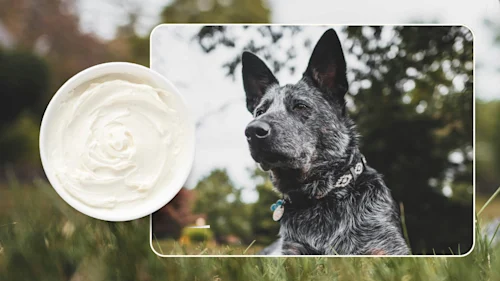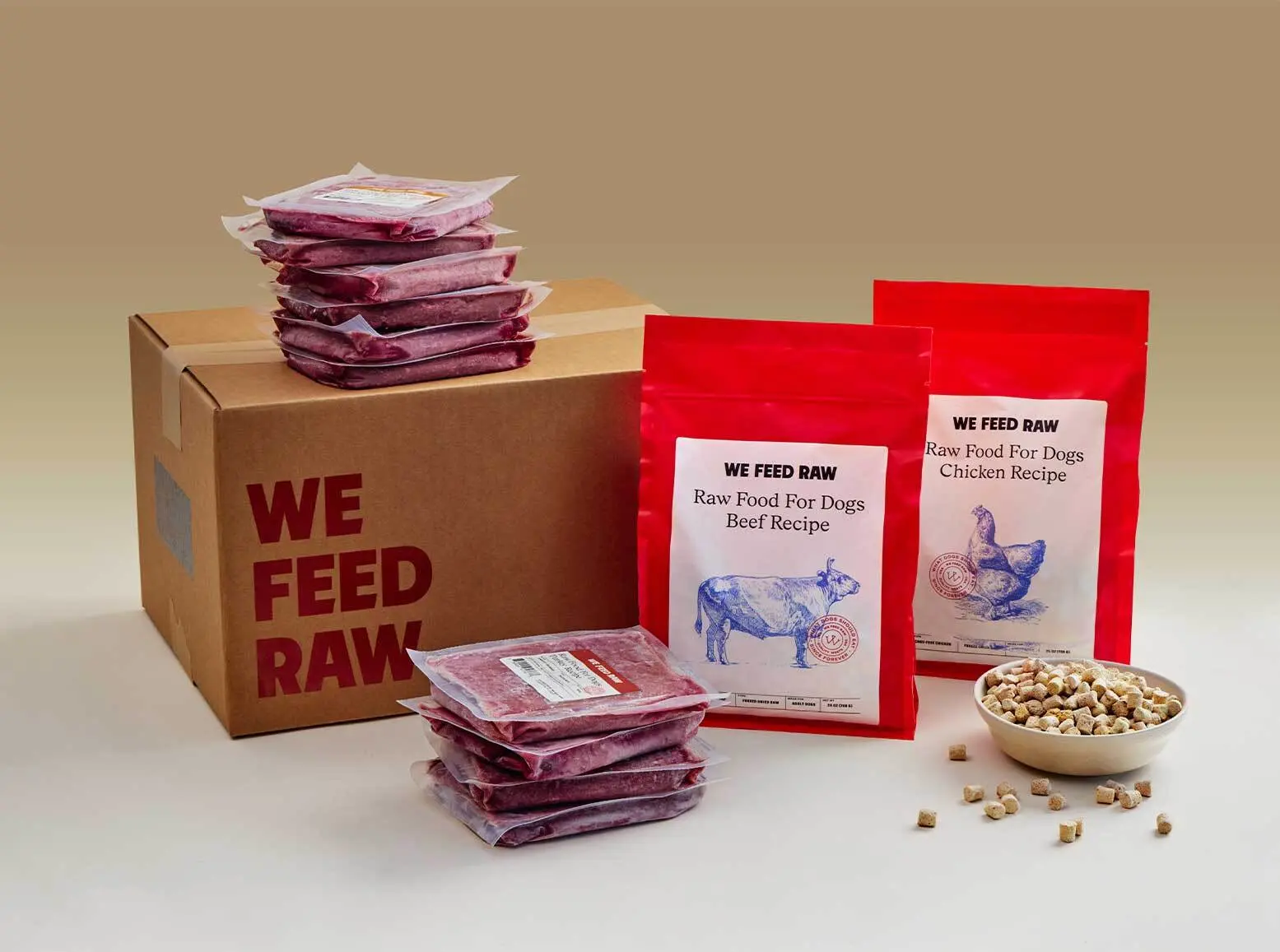
Can Dogs Eat Yogurt? Safe Treats and Guidelines
Table of Contents
Whether you eat yogurt because you like the taste or because you enjoy its probiotic benefits, you may have looked into your pup’s eyes while they watched you eat and wondered: Can dogs have yogurt?
While some dogs can have some types of yogurt, other dogs are lactose intolerant and will struggle to digest this tasty treat. Additionally, in the small amounts you can share with your dog, there isn’t as much of a probiotic benefit as you might expect.
So, can dogs eat yogurt? Here’s everything you need to know about sharing yogurt with your dog.
Can Dogs Have Yogurt: Understanding Different Types of Yogurt
Not all types of yogurt are the same, so let’s look at the different types and whether dogs can eat them.
Regular Yogurt
Thicker than drinkable kefir but thinner than Greek yogurt, regular yogurt contains more sugars and carbs than Greek yogurt, making it a less-healthy option. However, dogs can still eat regular yogurt as long as it’s plain and unsweetened.
Greek Yogurt
The thickest option, Greek yogurt contains more protein and less sugar than regular yogurt, making it a better choice for dogs. For reasons we’ll go into later, you should feed your dog plain Greek yogurt with no added fruit, sugar, or sweeteners.
Kefir
A drinkable type of yogurt, kefir is also fine for dogs. Kefir can be made with goat milk rather than cow milk, making it a better choice for dogs who are lactose intolerant because goat milk contains much less lactose than cow milk.
Dogs' Relationship with Dairy
Once puppies are weaned from their mother’s milk, they typically lose the ability to digest lactose, a natural sugar found in milk. Some dogs may be able to eat small amounts of dairy products without a problem, while others may have a milk allergy or may be lactose intolerant.
Symptoms of Milk Allergies in Dogs
If your dog shows any of these signs of milk allergies after eating dairy products, you should never give them yogurt:
•Hives
•Skin redness
•Breathing difficulties
•Facial swelling
•Excessive paw licking
•Extreme itchiness around the ears
•Nausea
•Lack of appetite
•Vomiting
•Diarrhea
Symptoms of Lactose Intolerance in Dogs
Dogs who are lactose intolerant may display the following signs after eating dairy products and should avoid eating yogurt:
•Bloating
•Abdominal discomfort
•Gas
•Lack of appetite
•Diarrhea
•Vomiting
Exploring the Benefits of Yogurt for Dogs
For dogs who can eat dairy products without problems, yogurt has a few benefits.
Probiotics
Also known as “good bacteria,” probiotics help with digestion and strengthen the immune system. However, the small amount of yogurt you can safely give your dog each day may not contain enough probiotics to be truly beneficial. Instead, you may want to look into a probiotic supplement designed for dogs.
Protein
The building block of muscle, cartilage, tendons, skin, and fur, protein is arguably the most important nutrient for dogs, and yogurt is a decent source of protein for a snack.
Yogurt for Dogs: Guidelines for Responsible Feeding
Here are some things to watch out for when choosing yogurt to share with your dog.
Added Sugar
Many yogurts contain added sugar to make them sweeter, which can contribute to diabetes, obesity, and dental disease. Stick with naturally sugar-free yogurt when you want to share with your pup.
Artificial Sweeteners
On the other hand, many sugar-free yogurts contain artificial sweeteners like xylitol (also known as birch sugar), which is toxic for dogs, so always check your yogurt label for artificial sweeteners before giving any to your dog.
Added Fruits
Yogurt that comes with fruit added in typically contains lots of syrup or sugar. Instead, buy plain yogurt and add fresh fruits to it yourself to share with your dog (except grapes and raisins, which are toxic for dogs).
Determining How Much Yogurt to Give a Dog
Now that you have an idea of what types of yogurt dogs can eat and know to look out for signs of a dairy allergy or lactose intolerance, let’s talk about how much yogurt dogs can eat.
In general, all your dog’s treats and snacks for the day (including yogurt) should make up no more than 10% of their diet. With that in mind, small dogs can have 1 teaspoon of yogurt per day, medium dogs can have 2 teaspoons, and large dogs can handle 3 teaspoons of yogurt per day.
You can let your dog lick the yogurt right off the spoon or make it a tasty addition to their meal.
Beyond Yogurt: Can Dogs Eat Raw Meat?
You want the very best for your dog, which is why you’re making sure it’s safe for your dog to eat yogurt before giving them any. If one of your reasons for wanting to share yogurt with your dog is for the gut health benefits, you should consider switching them to a complete and balanced raw diet.
Did you know that 70-80% of your dog’s immune system is in their gut? And a raw diet is actually the best food you can give your dog for a healthy gut.
While most dogs look little like their wolf ancestors on the outside, their insides are nearly identical, with hinged jaws, pointy teeth, highly acidic stomachs, and short digestive tracts. It’s clear that dogs are still designed to get their nutrients from raw muscle meat, organ meat, and bone rather than highly processed and carb-rich kibble.
We Feed Raw makes it easy to give your dog the gut health benefits of a raw diet. Our pre-portioned patties are nutritionally complete and balanced for dogs of all life stages, including the growth of large-breed puppies, and we use a cold-pressure process to inactivate potential pathogens, making our food safe for even sensitive puppy tummies.
To learn more about why We Feed Raw is the best choice for your dog, click here. To take our quiz and start your dog on a personalized meal plan, click here.
Frequently Asked Questions (FAQs)
How much yogurt can I give my dog?
Assuming your dog isn’t lactose intolerant or allergic to dairy, and you choose a yogurt with no added sugar, fruit, or artificial sweeteners, you can give a small dog 1 teaspoon of yogurt per day, a medium dog can handle 2 teaspoons of yogurt per day, and a large dog can have 3 teaspoons for yogurt per day.
Is yogurt beneficial for dogs?
While yogurt does have some benefits for dogs, such as probiotics and protein (especially in Greek yogurt), the amount of probiotics is low and many dogs can’t handle yogurt due to being lactose intolerant or allergic to dairy. Overall, yogurt may not be a net benefit for your dog’s health.
Can dogs eat yogurt?
Some dogs can eat some types of yogurt. As long as a dog isn’t lactose intolerant or allergic to dairy, they can have small amounts of yogurt that doesn’t contain added sugar, fruit, or artificial sweeteners.

Our Meals Change Lives.
(Theirs + Yours.)
See health improvements from our raw meals in as little as 1 week.
